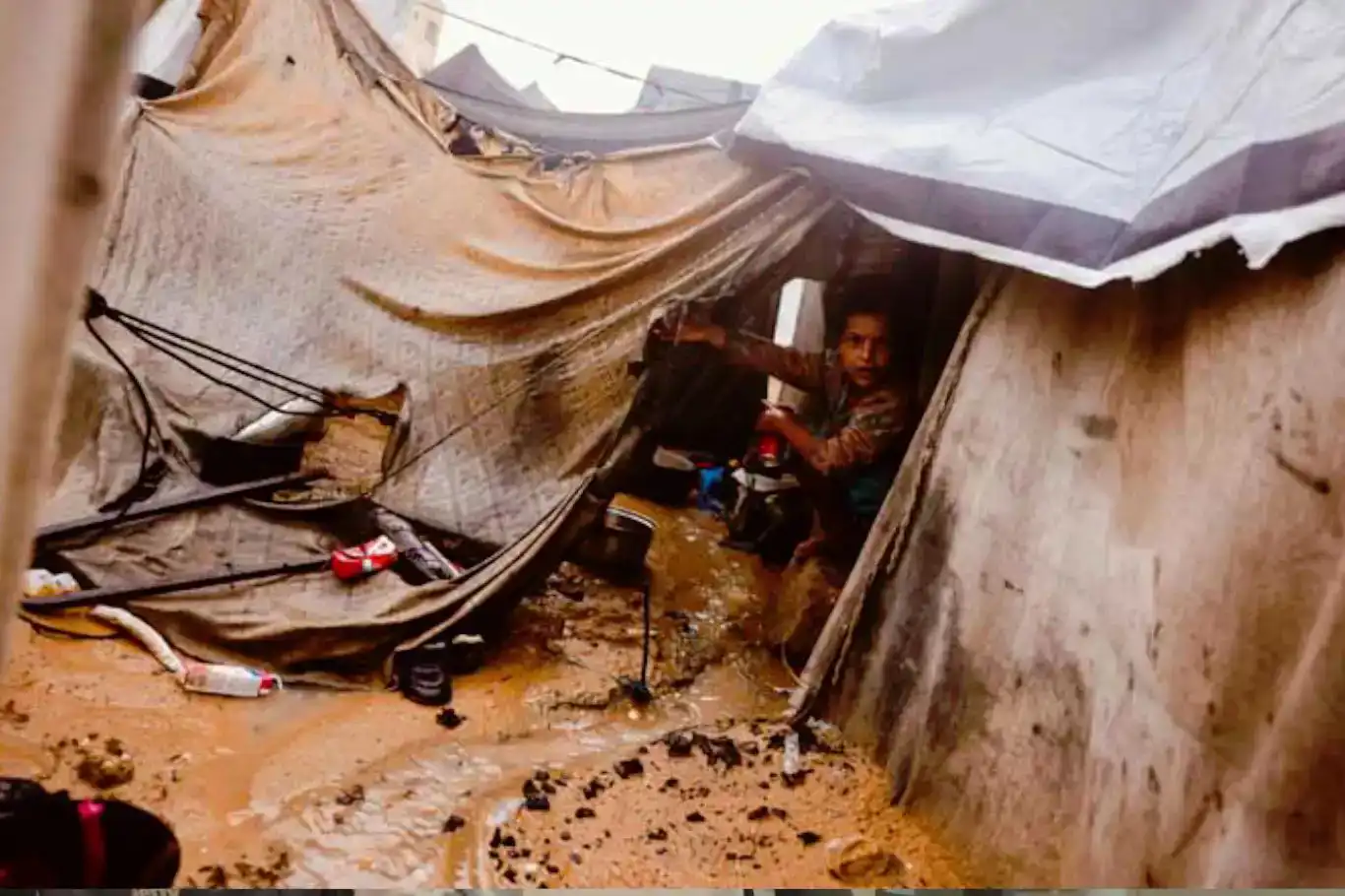Relentless suffering in Gaza: Displaced families endure flooded tents amid harsh winter storms


Torrential rains have submerged entire tent camps in southern Gaza, leaving thousands of displaced Palestinians struggling to survive in freezing conditions with almost no shelter, heating, or basic supplies. Humanitarian needs continue to escalate as storms worsen an already catastrophic crisis.
The agony of Gaza’s displaced population deepened once again as days of heavy rainfall and a sharp drop in temperatures turned makeshift tent settlements into flooded, mud-filled disaster zones. Families who had already lost their homes in the ongoing conflict now find themselves battling brutal winter conditions with almost nothing to protect them.
In the southern city of Khan Younis, particularly the Mevasi area, hundreds of tents sheltering displaced civilians were inundated after relentless downpours swept across the region. What were once fragile living spaces have now become pools of cold water and thick mud, leaving families stranded, freezing, and unable to move through the camp.
Residents reported that rainwater seeped through the thin tent fabric, soaking bedding, clothing, and the few belongings they had managed to salvage. Many described fleeing their own tents in the middle of the night as water levels rose, fearing for their children’s safety as strong winds threatened to collapse the structures completely.
Children and the elderly are among those most severely affected. With temperatures dropping significantly and a critical shortage of blankets, winter clothing, and heating materials, thousands face life-threatening conditions. Aid underscores that these camps, never meant for long-term living, are entirely unprepared for harsh weather—yet they remain the only option for countless families.
A new low-pressure system is expected to continue bringing thunderstorms across Gaza, further worsening the situation. Every new rainfall intensifies the suffering, turning already unbearable living conditions into a fight for survival.
These storms follow earlier flooding on 15 November, when thousands of tents were similarly submerged, destroying vital supplies and leaving families exposed to the cold. Despite repeated warnings, humanitarian access remains severely restricted, leaving displaced Palestinians with minimal assistance as the winter season advances.
The absence of protective materials—such as waterproof coverings, reinforced shelter, or adequate heating—has left the displaced population acutely vulnerable. Community members stress that without urgent intervention, the humanitarian catastrophe will deepen rapidly.
Already struggling with extreme shortages of food, clean water, medicine, and sanitation, Gaza’s displaced civilians now face yet another layer of hardship. As the storms continue, many fear that their makeshift shelters will not withstand the coming days.
For the families crowded into these vulnerable tent camps, every night brings the same haunting question: How much more suffering must they endure before meaningful relief arrives?(ILKHA)
LEGAL WARNING: All rights of the published news, photos and videos are reserved by İlke Haber Ajansı Basın Yayın San. Trade A.Ş. Under no circumstances can all or part of the news, photos and videos be used without a written contract or subscription.
The British Army has suspended the use of its new Ajax armoured fighting vehicle for two weeks following reports that about 30 soldiers experienced vibration- and hearing-related problems in a training exercise this past weekend, the Ministry of Defence (MoD) said.
UN Secretary-General António Guterres said on Tuesday that the Palestinian people have the right to dignity, justice, and self-determination, calling the establishment of a Palestinian state a legitimate right under international law.
Mawlavi Abdul Wali Haqqani, the Deputy Minister of Public Health of the Islamic Emirate of Afghanistan, has arrived in Türkiye at the head of a high-ranking delegation to pursue expanded cooperation in the health sector.